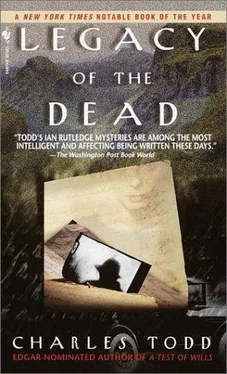Charles Todd - Legacy of the Dead
Здесь есть возможность читать онлайн «Charles Todd - Legacy of the Dead» весь текст электронной книги совершенно бесплатно (целиком полную версию без сокращений). В некоторых случаях можно слушать аудио, скачать через торрент в формате fb2 и присутствует краткое содержание. Жанр: Полицейский детектив, на английском языке. Описание произведения, (предисловие) а так же отзывы посетителей доступны на портале библиотеки ЛибКат.
- Название:Legacy of the Dead
- Автор:
- Жанр:
- Год:неизвестен
- ISBN:нет данных
- Рейтинг книги:5 / 5. Голосов: 1
-
Избранное:Добавить в избранное
- Отзывы:
-
Ваша оценка:
- 100
- 1
- 2
- 3
- 4
- 5
Legacy of the Dead: краткое содержание, описание и аннотация
Предлагаем к чтению аннотацию, описание, краткое содержание или предисловие (зависит от того, что написал сам автор книги «Legacy of the Dead»). Если вы не нашли необходимую информацию о книге — напишите в комментариях, мы постараемся отыскать её.
Legacy of the Dead — читать онлайн бесплатно полную книгу (весь текст) целиком
Ниже представлен текст книги, разбитый по страницам. Система сохранения места последней прочитанной страницы, позволяет с удобством читать онлайн бесплатно книгу «Legacy of the Dead», без необходимости каждый раз заново искать на чём Вы остановились. Поставьте закладку, и сможете в любой момент перейти на страницу, на которой закончили чтение.
Интервал:
Закладка:
In another half hour he was speaking to her. She had been the nurse in charge of Saxwold’s most seriously wounded men, and was now at a hospital in Cambridge.
Her voice came over the telephone clearly, forceful, with the slight accent of Yorkshire in it.
Rutledge explained what he was after. “I’m looking for anyone who might have been friends with a Captain Robert Burns who was at Saxwold in 1916. He was there for nearly a month, then was released to convalesce in London.”
“Ah, yes, I do recall Captain Burns. A very nice man. I heard much later that he’d returned to the Front and been killed. A waste.”
“Indeed. There was a woman, Eleanor Gray, who met him either in London or at Saxwold. Do you recall her?”
“I thought you wanted to know who among the wounded was friendly with him! I have no idea who Eleanor Gray is, Inspector. I had little time to waste on visitors. These were seriously wounded men in my care.”
“The problem is that I don’t know with any certainty whether Eleanor Gray introduced Captain Burns to the man I’m seeking or if she met him through Burns. If she met him through Burns, it might be someone he knew at Saxwold.”
“I understand now. Well, since I have no knowledge of this woman, I suggest we begin with the patients. There were a number of critically wounded men at Saxwold at the time, and they seldom mixed with the other patients. Certainly not often enough for a friendship to be formed. Therefore you must be interested in the men who were more or less able to move about or have visitors. If I remember correctly, there were at least twenty of those. Of them I would say that Captain Burns was friendly with three or four.”
She gave him names and told him how badly each was wounded. Three had lost limbs. Rutledge discounted them. Mrs. Raeburn had said she couldn’t tell how the man at her door had been wounded. The fourth had been blinded.
Trying to begin from another end of the puzzle, Rutledge asked, “Did you have patients from Palestine in Saxwold?”
“There was indeed one man who had served in Palestine. He’d been an intelligence officer, wounded, and sent home. Captured by the Turks, apparently, for he had been severely tortured. We feared more for his mind than his body, I must tell you that. He didn’t know who he was and he was by turns raving, silent, or alarmingly alert. Touch him and he was instantly back in captivity, striking out quick as a snake. We kept him in a room upstairs, under the eaves, where he didn’t disturb the other patients. Once Captain Burns could move about, he spent a good deal of time with the very ill, writing letters and so forth. The Captain made an effort to include Major Alexander in his rounds, though the stairs were difficult for a man with a serious back injury.”
“Alexander? Do you have a first name?”
“I’m sorry, no. He told me repeatedly that he was called Zander Holland, but the only name on his tag when he was brought in was Alexander. Which isn’t surprising, we’ve had men with no name at all. But as he began to improve, the Major was transferred to another hospital. I was told later that he made a full recovery. I was glad to hear it. One of the specialists who came to look at the burn cases had seen him in another hospital.”
“He’d been burned?”
“Oh, yes, it was part of the torture, you see. Systematic burning.”
Poor devil! Rutledge thought. “You have no record of his unit?”
“I told you. Once he began recovering, the Army saw fit to move him.”
“Did Alexander keep in touch with Burns? After he was transferred?”
“I can’t answer that. But I doubt it. Captain Burns would have told me if he’d had news. Whether they met again in London, I can’t say. I wouldn’t be at all surprised if the Captain did make a point of finding him. It was the sort of man he was. He cheered up a good many people, ill as he was. It was his nature.”
But that was all she could give Rutledge on the patient named Alexander.
He left his telephone number with her. “If you think of anything else that might be useful, I’d be grateful if you got in touch.”
“I shall, Inspector,” she said, and hung up the receiver.
Rutledge spent another hour talking to people he knew in the War Office. But he had no luck there. One official told him that he rather thought he remembered the chap Rutledge was asking about and had heard that he went to France after he’d been declared fit for return to duty. “But I’m not sure his name was Holland. And the only Alexander I recall was a sergeant-major in the Fusiliers. Tracking your man down will be well nigh impossible without more information, old boy. I haven’t time to play hunches. And we have a bloody long list of wounded!”
At the hotel desk, Rutledge said to the young woman on duty, “Could you tell me, please, if there is anyone in Duncarrick by the name of Alexander? He was an officer in the war. I’d like to look him up if he’s here.”
“I don’t believe there’s anyone in town with that name.” She frowned prettily, her hands toying with the pen she’d been using.
Hamish said, “He might not live in the town.”
But Rutledge was already asking that question.
“I’m sorry. Perhaps you could ask Constable Pringle or Inspector Oliver. They’d know. Or Mr. Elliot, perhaps.”
He began with Constable Pringle. Rutledge found him still at his desk and put the question to him. Pringle considered. “There’s an Alexander out on the road to Jedburgh. But he wasn’t in the war, sir. He’s seventy if he’s a day.”
“Children?”
“Two daughters. That’s all I ever heard about. Old maids, both of them.”
Another dead end.
Rutledge went out to walk, restless and angry.
Hamish said, “It’s no’ your fault!”
“Cold comfort!” he retorted, long strides eating up the distance to The Reivers. He passed it without looking and was well out the western road before turning and walking back to the town. “Fiona sits in that cell, waiting for trial, and there’s going to be a conviction. All I needed was a name. They’ve given me one. If Alexander doesn’t live in the neighborhood of Duncarrick, there’s no way to find him. Damn the man!” But it was useless to damn anyone. There were still other names to track down.
Nearing the main square, Rutledge came across Oliver.
He was not a happy man.
“You’ve been meddling again! You told me that you were wanting to see the glen. Instead you went to find the Lawlor girl. And she’s gone missing!” He made it sound like Rutledge’s fault.
“I did see the glen,” Rutledge told him. “And someone saw fit to shoot at me while I was there. Who did you tell that I was on my way to Glencoe?”
“What do you mean, someone shot at you?” He glared at Rutledge. “I called Inspector MacDougal as you’d asked. I don’t know who might have overheard the call. MacDougal wasn’t in his office when I tried from the station. So I waited until after my lunch and called again from the hotel.”
From that stuffy telephone closet. Where Oliver, not thinking about it, must have left the door ajar for air. And who had been in the police station on his earlier attempt to reach Glencoe? McKinstry? Pringle?
“Where was McKinstry most of yesterday?”
“It was his day off. You’ll have to ask him that.”
“There’s no way,” Hamish pointed out, “to be sure it was the telephone. You could ha’ been seen in Brae-or anywhere on the road-and followed.”
“And what’s this,” Oliver went on testily, “about the brooch not being in Betty’s hands for a year or more? That’s nonsense!”
“I don’t think it is.” He gave it a split second’s thought, then said, “I can tell you the name of a jeweler’s shop on a side street in Glasgow. Send McKinstry with the brooch to ask if the owner recognizes it.”
Читать дальшеИнтервал:
Закладка:
Похожие книги на «Legacy of the Dead»
Представляем Вашему вниманию похожие книги на «Legacy of the Dead» списком для выбора. Мы отобрали схожую по названию и смыслу литературу в надежде предоставить читателям больше вариантов отыскать новые, интересные, ещё непрочитанные произведения.
Обсуждение, отзывы о книге «Legacy of the Dead» и просто собственные мнения читателей. Оставьте ваши комментарии, напишите, что Вы думаете о произведении, его смысле или главных героях. Укажите что конкретно понравилось, а что нет, и почему Вы так считаете.












